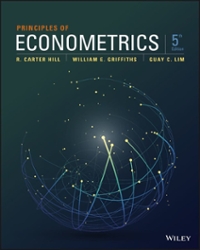Does a mother's smoking affect the birthweight of her child? Using data in the file bweight_small taken
Question:
Does a mother's smoking affect the birthweight of her child? Using data in the file bweight_small taken from Cattaneo (2010), \({ }^{31}\) we explore this question. The file bweight contains more observations.
a. Calculate the sample means of \(B W E I G H T\) for mothers who smoke \((M B S M O K E=1)\) and those who do not smoke \((M B S M O K E=0)\). Use the \(t\)-test of the equality of population means given in Appendix C.7.2, Case 1, to test whether the mean birthweight for smoking and nonsmoking mothers is the same. Use the \(5 \%\) level of significance.
b. Estimate the regression BWEIGHT \(=\beta_{1}+\beta_{2} M B S M O K E+e\). Interpret the coefficient of MBSMOKE. Can we interpret the coefficient as the "average treatment effect" of smoking? Test the null hypothesis that \(\beta_{2} \geq 0\) against \(\beta_{2}
c. Add to the model in (b) control variables MMARRIED, MAGE, PRENATAL1, and FBABY. Are any of these variables significant predictors of an infant's birthweight? Which signs of the significant coefficients are consistent with your expectations? Does the estimate of the coefficient of MBSMOKE change much?
d. Estimate the regression of BWEIGHT on MMARRIED, MAGE, PRENATAL1, and FBABY for mothers who smoke \((M B S M O K E=1)\) and those who do not smoke \((M B S M O K E=0)\). Carry out a Chow test of the equivalence of these two regressions at the \(5 \%\) level.
e. Use equation (7.37) to obtain the estimate of the average treatment effect using the results from (d). Compare this estimate of the average treatment effect to the estimates in (b) and (c).
Data From Equation 7.37:-

Step by Step Answer:

Principles Of Econometrics
ISBN: 9781118452271
5th Edition
Authors: R Carter Hill, William E Griffiths, Guay C Lim





